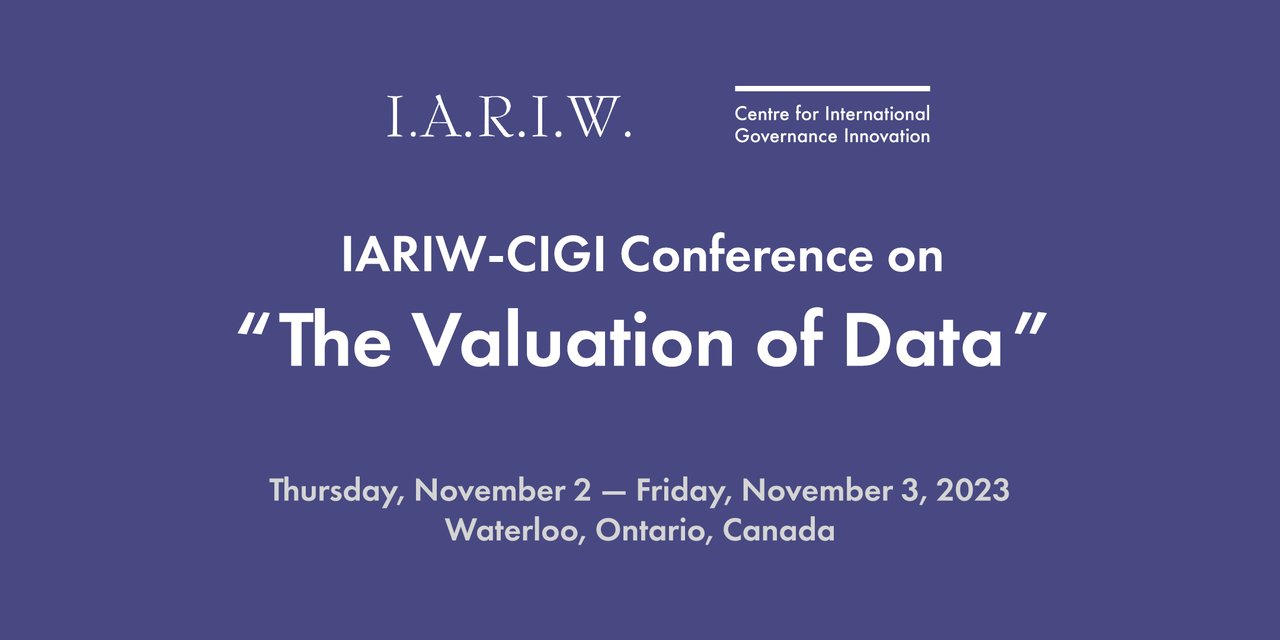The International Association for Research in Income and Wealth (IARIW), established in 1947, organizes conferences on topics related to income and wealth throughout the world, generally in partnership with national statistical offices. In addition to its biennial General Conference, the IARIW also organizes two smaller special conferences, with a regional or topic/theme dimension in non-General Conference years.
The IARIW is partnering with the Centre for International Governance Innovation (CIGI), an independent, non-partisan think tank, to hold a conference on the valuation of data. The IARIW-CIGI conference will take place November 2–3, 2023, at the CIGI Campus in Waterloo, Ontario, Canada.
The purpose of this conference is to push the boundaries of new knowledge on the valuation of data, bringing together experts and researchers from various fields to explore innovative approaches and insights. The conference will feature 19 papers that will advance the research in data valuation, covering topics that will drive transformative impact in the field and shape the future of data valuation practices.
The measurement of the value of data is a topic of interest to many IARIW members. It is also part of the agenda on the current System of National Accounts (SNA) update to be finalized in 2025. Research from the conference can potentially be used for the SNA update.
Conference Program and Registration
This conference is free and open to the public. As Canada is the host country, Canadians and CIGI affiliates are not required to become IARIW members to attend the conference. International attendees and/or registrants not invited by CIGI must currently hold a membership or become an IARIW member to participate. To learn more about IARIW memberships, please visit https://iariw.org/membership-account/membership-levels/.
Conference attendees can expect two full days of in-person programming, including panel presentations and discussions, keynote addresses and networking. Lunch and refreshments will be provided each day at the CIGI Campus. A welcome reception will be hosted the evening of November 1 and a full conference dinner the evening of November 2. An optional excursion will be arranged to Niagara Falls on November 4 (8:00 AM to 7:30 PM) and pre-registration will be required.
Registration for the conference is required and can be completed here by November 1, 2023.
To view the working agenda, please visit https://iariw.org/iariw-cigi-conference-november-2-3-2023/.
Travel and Accommodations
All conference attendees are responsible for their own travel arrangements. CIGI has secured a hotel room block nearby with a preferred rate for all registrants. Recommendations and additional details about travel to Waterloo, Ontario, Canada, can be found in the “Logistical Information for Conference Delegates” guide you will receive upon registration.
Program Committee
Diane Coyle, Bennett Professor of Public Policy and co-director of the Bennett Institute for Public Policy at the University of Cambridge, and member of the IARIW Council, will serve as co-chair of the program committee from the IARIW side. She is an expert in the data valuation field, having produced many studies on the topic, including the recent survey (Coyle and Manley 2022). Bob Fay, managing director of digital economy at CIGI, will serve as co-chair of the program committee.
The program committee includes both IARIW and CIGI representatives. Members appointed by the IARIW are Wendy Li from Moon Economics, Richard Heys from the UK Office for National Statistics and Marshall Reinsdorf, recently retired from the International Monetary Fund. These individuals are involved in the work on data valuation related to the SNA update. Members appointed by CIGI are Alison Gillwald, executive director of Research ICT Africa, and Carolina Rossini, co-founder and director for policy and research, Datasphere Initiative.
Challenges in the Valuation of Data
Data forms a powerful value chain: data, and especially big data, can be used with artificial intelligence technologies to create powerful analytics that can vastly improve policy and business decision making. Digital technology firms that are first movers in big data have tremendous advantages through economies of scale and scope, network effects and information asymmetries, and these characteristics have driven up their value. At the same time, the value of data itself does not appear on the balance sheet of any firm, nor in the national balance sheets of countries. Importantly, given the characteristics of the data-driven economy, externalities arise, and the social value and private value of data can diverge in both positive and negative ways. These externalities are rarely considered and valued.
There are a number of methods to value data (cost based, income based and market based) and these methods have been applied in a number of studies (for example, Deloitte 2017; CPA Canada 2021; Statistics Canada 2019). But, as Coyle and Manley (2022) and the Organisation for Economic Co-operation and Development (2022) note, no ideal or agreed-upon methodology has yet emerged to measure data’s value, largely because its value depends on its usefulness in a particular context. That context is framed by governance (the rules and regulations that determine how data can be used). The latter includes the many regulations in place, which will vary across jurisdictions, but it also reflects an absence of regulation, or the inability to enforce it, especially around uses of personal data. There has been much focus on the non-rivalrous nature of data, but less focus has been on its excludability. This excludability exists for many different reasons, both legal and de facto, including regulations such as intellectual property rules, privacy and data governance regulations as well as access to capital and skills.
More generally, there is a lack of information about data assets. Thus, to fully unleash the value of data — for individuals, firms and society — requires appropriate governance, which involves regulations in several areas at the national and international levels, including for privacy and cybersecurity as well as around areas such as data portability and platform interoperability. In turn, regulations depend upon clear and consistent standards and metrics to provide decision makers with the means to determine how best to govern this critically important asset. Regulation and governance will also be shaped and constrained by technical possibilities.



